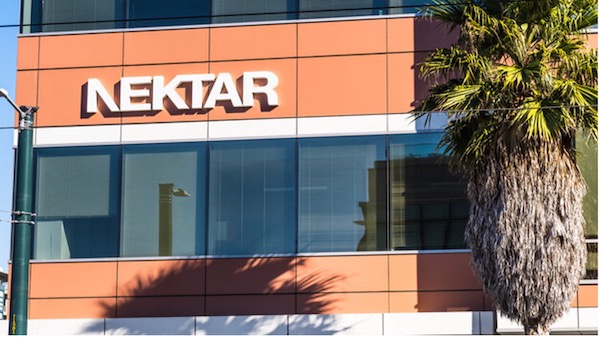unrNektar Flags Lilly’s Miscalculations in Rezpeg Atopic Dermatitis Trials
August 9, 2023
Source: drugdu
 534
534
By Tristan Manalac

Pictured: Nektar signage at its headquarters in California/iStock, Sundry Photography
Nektar Therapeutics on Monday revealed that former partner Eli Lilly had incorrectly calculated efficacy data for its investigational regulatory T-cell stimulator rezpegaldesleukin (rezpeg), which the company is developing as a treatment for atopic dermatitis.
At the 31st Congress of the European Academy of Dermatology and Venereology (EADV), held in September 2022, Lilly presented data from a Phase Ib study of rezpeg, showing that while the candidate elicited positive and dose-dependent improvements in key efficacy measures, these effects ultimately fell short of statistical significance.
At 12 weeks, Lilly erroneously reported the 12-µg/kg and 24-µg/kg doses of rezpeg were associated with a 53% and 66% improvement in Eczema Area and Severity Index (EASI) scores, respectively, whereas placebo induced a 49% improvement relative to baseline, Nektar reported. Neither dose was significantly superior to placebo, according to the company.
However, Nektar’s re-analysis demonstrated that at the highest dose level, rezpeg treatment led to an 83% improvement in EASI scores at 12 weeks, which was statistically better than placebo with a p-value of 0.002, according to the company. In addition, the corrected data also showed a higher proportion of patients achieving a 75% reduction in EASI scores from baseline.
Nektar’s corrected analysis reveals “that rezpeg, a novel and differentiated T regulatory cell mechanism, holds great promise for treating patients with atopic dermatitis,” CEO Howard Robin said in a statement.
Rezpeg is a novel, first-in-class molecule that targets the IL-2 receptor complex to selectively stimulate the multiplication of regulatory T-cells, in turn addressing the immune dysregulation that underpins many autoimmune and chronic inflammatory disorders.
Lilly and Nektar signed a strategic collaboration in July 2017 to co-develop rezpeg. However, in April 2023—following the miscalculated data presented at EADV 2022—Lilly backed out of the alliance and returned all rights to rezpeg back to Nektar.
After regaining control over the rezpeg program, the California biotech was able to access raw data files from the Phase Ib study, which it then reviewed and turned over to an independent statistical firm for validation.
The re-analysis also flagged miscalculations made by Lilly regarding another Phase Ib study, with corrections revealing a stronger treatment effect of rezpeg on the Psoriasis Area and Severity Index score. Nektar said it has already informed Lilly’s internal statistical and clinical teams of the errors and the pharma giant confirmed these mistakes through written communications.
Beyond atopic dermatitis, the Lilly-Nektar partnership also studied the potential of rezpeg in systemic lupus erythematosus. In February 2023, however, the candidate failed the Phase II ISLAND trial, unable to outperform placebo at improving SLEDAI-2K scores. This stumble forced Lilly to forego its Phase III plans in this indication and factored into its decision to return rezpeg to Nektar.
Going forward, Nektar said it will announce a new study design for the Phase IIb study of repzeg in biologic-naïve patients with moderate to severe atopic dermatitis who have progressed on topical corticosteroids. The study is slated to begin in October 2023.
Read more on
- The first subject has been dosed in the Phase I clinical trial of Yuandong Bio’s EP-0210 monoclonal antibody injection. February 10, 2026
- Clinical trial of recombinant herpes zoster ZFA01 adjuvant vaccine (CHO cells) approved February 10, 2026
- Heyu Pharmaceuticals’ FGFR4 inhibitor ipagoglottinib has received Fast Track designation from the FDA for the treatment of advanced HCC patients with FGF19 overexpression who have been treated with ICIs and mTKIs. February 10, 2026
- Sanofi’s “Rilzabrutinib” has been recognized as a Breakthrough Therapy in the United States and an Orphan Drug in Japan, and has applied for marketing approval in China. February 10, 2026
- Domestically developed blockbuster ADC approved for new indication February 10, 2026
your submission has already been received.
OK
Subscribe
Please enter a valid Email address!
Submit
The most relevant industry news & insight will be sent to you every two weeks.



